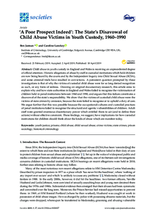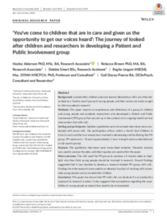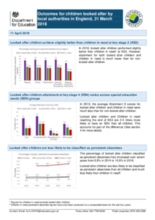

Displaying 821 - 830 of 1646
The focus of this collection is the promise of public health approaches to child protection and welfare systems development and delivery, and this chapter from the book Re-Visioning Public Health Approaches for Protecting Children is a case study of what such an approach looks like in practice.
This chapter from the book Leaving Care and the Transition to Adulthood explores progress towards realizing the rights of young people in and leaving out of home care in Australia, Sweden and the UK.
Family for Every Child is looking for a Knowledge Management Coordinator to strengthen the Alliance’s capacity to transform information into knowledge, which both informs their own joint work and is used to evidence impact, and influence others.
This study aims to explore how care is perceived and practiced among Looked after children and care leavers (LACCL) and those with a duty of care for them.
Drawing on original documentary research, this article aims to explain why and how state authorities in England and Wales failed to recognise the victimisation of children held in penal institutions between 1960 and 1990, and argues that this failure constitutes a disavowal of the state’s responsibility.
The authors of this article reflect on the recently published Care Crisis Review 2018, a sector‐led review, which examines the reasons for the rise in care proceedings and the number of children in care.
This open access paper reports on experiences and reflections of a group of children and young people and academic researchers who developed a Patient and Public Involvement (PPI) group that was set up in the context of an ongoing health service intervention trial with Looked after children and care leavers (denoted as LAC).
The Care Pathways and Outcomes Study is a longitudinal study following 374 children who were in care and under five years old on 31/3/2000 in Northern Ireland. The study followed where the young people ended up living, whether they returned to their birth parents, went into kinship or non-relative foster care, or were adopted.
This statistical release provides national and local authority (LA) level information on the outcomes for children who have been looked after continuously for at least 12 months at 31 March 2018, by local authorities in England.
This study uses a randomised controlled trial to examine the impact of Family Group Conferencing on caseworkers’ perceptions of families’ levels of social support.



